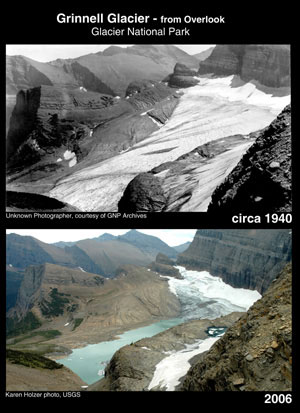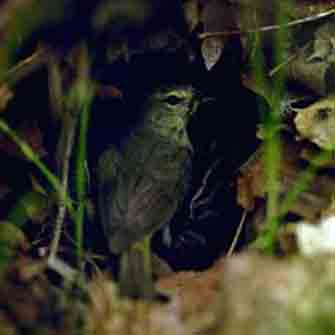- Home
- About S&T
- Taxa/Organisms
- Ecosystems
- Issues
- Methods & Tools
- Reports & Publications
- Location
- Search
June 2008 | Publisher: Other Federal Agency (U.S. Environmental Protection Agency (EPA)) | Format: URL
www.climatescience.gov — The U.S. Environmental Protection Agency has released a report that can help reduce the potential impact of climate change on estuaries, forests, wetlands, coral reefs, and other sensitive ecosystems. The report identifies strategies to protect the environment as these changes occur. The report finds that climate change can increase the impact of More...

2008 | Publisher: USGS | Format: URL
soundwaves.usgs.gov — U.S. Geological Survey (USGS)'s Western Region held an internal USGS workshop on Sea-Level-Rise Impacts on November 6-7, 2007, in Menlo Park, California. The meeting was attended by 30 scientists from four USGS disciplines (geology, geography, biology, and water) and 13 different science centers in the Western Region. In part a follow-up to the More...

2008 | Publisher: USGS | Science Center: Fort Collins Science Center (FORT, Ft. Collins) | Format: URL
www.fort.usgs.gov — Irreplaceable resources such as water, timber, biodiversity and recreational opportunities are all being affected by the earth's global changing climate. Ecological disturbances - wildfire, insect outbreaks, and the spread of invasive species - are also accelerating and changing the earth's ecosystems. US Geological Survey (USGS) and US Fish and More...

Publisher: USGS | Science Center: Northern Rocky Mountain Science Center (NRMSC, Bozeman) | Format: .PDF
www.nrmsc.usgs.gov — The ecology of hoofed big-game species in the northern Rocky Mountains, known as ungulates, is strongly influenced by climate. Climate change impacts summer precipitation, winter snow pack, and the timing of spring green-up, all of which control animal physiology, demography, diet, habitat selection, and predator prey interactions. However, the More...

Publisher: Academic Institution (Academic Institution(University of Washington-Seattle Campus)) | Format: .PDF
www.cfr.washington.edu — The Western Mountain Initiative is a team of USGS and USDA Forest Service scientists working together to better understand and predict the responses of Western mountain ecosystems to climatic variability and change, emphasizing sensitivities, thresholds, resistance, and resilience. The objective of the Western Mountain Initiative (WMI) is to More...

Publisher: USGS | Science Center: Northern Rocky Mountain Science Center (NRMSC, Bozeman) | Format: URL
nrmsc.usgs.gov — This web resource documents glacial decline through photography, pairing historic images with contemporary photos, giving global warming a face and made climate change a relevant issue to viewers. The images are an effective visual means to help viewers understand that climate change contributes to the dynamic landscape changes so evident in More...

Publisher: USGS | Science Center: Northern Rocky Mountain Science Center (NRMSC, Bozeman) | Format: URL
nrmsc.usgs.gov — Northern Rocky Mountain Science Center has been monitoring, conducting research, and modeling ecosystem responses to climatic variability since 1991, first at Glacier National Park but eventually throughout the western U.S. in collaboration with other scientists. Coordination with scientists around the world have led to mountain research networks More...

Publisher: Other Federal Agency (Climate Science, United States Climate Change Science Program) | Format: URL
www.climatescience.gov — This is the final report of the Uses and limitations of observations, data, forecasts, and other projections in decision support for selected sectors and regions, by the U.S. Climate Change Science Program and the Subcommittee on Global Change Research. Users can link to the full Final Report, Individual Sections, an Executive Summary, More...

Publisher: Academic Institution (Indiana University) | Format: URL
www.spea.indiana.edu — SLAMM-View is a web browser-based mapping application, designed to facilitate the comparison of the results from different dates and sea-level rise scenarios. The Sea Level Affecting Marshes Model (SLAMM) simulates the dominant processes involved in wetland conversions and shoreline modifications during long-term sea level rise. Map distributions More...

Publisher: Academic Institution (University of Montana) | Format: URL
www.umt.edu — This website links to graphs which show how bird species and their nesting habitats and communities have been effected by climate variation. The website also links to other research projects, publications and lab members. Climate change may impact communities in a variety of ways. Most attention has focused on earlier breeding in warmer years. More...

Publisher: USGS | Science Center: Florida Integrated Science Center (FISC, Gainesville) | Format: URL
fl.biology.usgs.gov — Coral reefs in the Caribbean and western Atlantic are deteriorating in response to hurricanes, coral diseases, anchor damage, sedimentation, and other stresses. USGS biologists at the Caribbean Field Station are documenting the current status of coral reefs and the effects of some of these stresses within Virgin Islands National Park (St. John), More...

Publisher: NBII | Format: URL
www.nbii.gov — Natural resource managers face complex decisions that require a clear understanding of the status of wildlife populations and their habitats. Monitoring is key to making effective management decisions and evaluating the outcomes of those decisions. The goal of NRMP is to improve the accessibility of monitoring efforts to resource managers to aid More...
